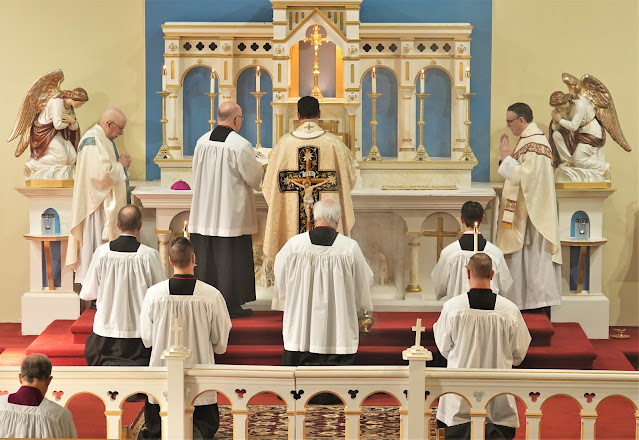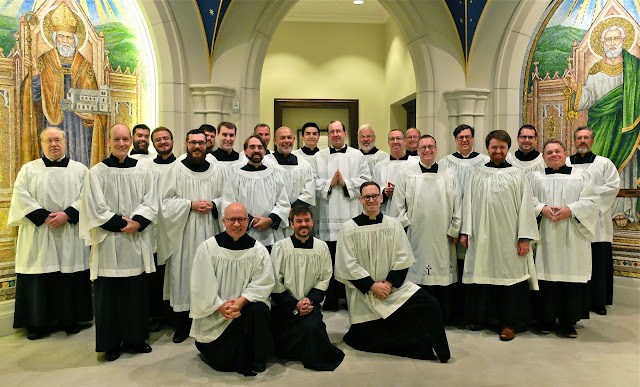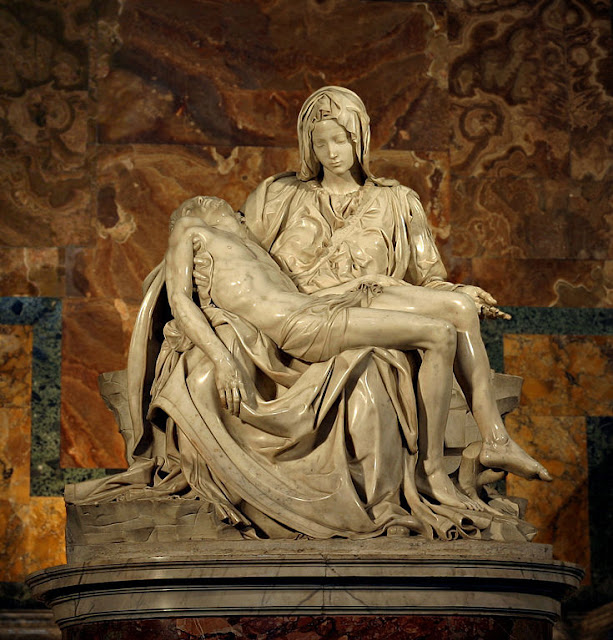Mass Identity

- are humbled before God and embraced by our Maker;
- are grateful recipients of God's sustaining grace, His very life, the Body and Blood of Jesus Christ;
- recognize we can do nothing without God;
- acknowledge our utter dependence on God for our salvation and eternal life;
- are commissioned to serve the mission of Christ and His Church, the salvation of souls.
- to adore God as our Creator and Lord.
- to thank God for His many favors.
- to ask God to bestow His blessings on all men.
- to satisfy the justice of God for the sins committed against Him.
- to cooperate with God for the salvation of souls.
Liturgy is “medial”—that is, neither pure activity on our part, nor pure passivity, but both and neither, like the “middle voice” of some ancient languages. One way to say this, however awkward it might strike the modern English-speaker’s ear, would be to say, “I was gathered into the offering of the Son to the Father.” Shorthand would be modestly simpler: “I participated in the self-offering of God today.” Daniel/Kwasniewski/NLM
Life is more than meets the eye. Catholic Christians meet daily life with faith, faith in Jesus Christ. Jesus gives us His Spirit to enable us to live and love as His disciples.
John 13:34
A new commandment I give to you, that you love one another; even as I have loved you, that you also love one another.
St. John 14:15-17
If you love me, you will keep my commandments. And I will pray the Father, and he will give you another Counselor, to be with you for ever, even the Spirit of truth, whom the world cannot receive, because it neither sees him nor knows him; you know him, for he dwells with you, and will be in you.
Being (ens)Unity (unum)Truth (verum)Goodness (bonum)Beauty (pulchrum)
I have always lived by a simple principle: you must speak the truth in a beautiful way for the good of the other. - Fr. Harrison Ayre
The Much Needed Grace
II. GRACE CCC | excerpts
1996 Our justification comes from the grace of God. Grace is favor, the free and undeserved help that God gives us to respond to his call to become children of God, adoptive sons, partakers of the divine nature and of eternal life.
1997 Grace is a participation in the life of God. It introduces us into the intimacy of Trinitarian life: by Baptism the Christian participates in the grace of Christ, the Head of his Body. As an "adopted son" he can henceforth call God "Father," in union with the only Son. He receives the life of the Spirit who breathes charity into him and who forms the Church.
1998 This vocation to eternal life is supernatural. It depends entirely on God's gratuitous initiative, for he alone can reveal and give himself. It surpasses the power of human intellect and will, as that of every other creature.
1999 The grace of Christ is the gratuitous gift that God makes to us of his own life, infused by the Holy Spirit into our soul to heal it of sin and to sanctify it. It is the sanctifying or deifying grace received in Baptism. It is in us the source of the work of sanctification:
Therefore if any one is in Christ, he is a new creation; the old has passed away, behold, the new has come. All this is from God, who through Christ reconciled us to himself.
2000 Sanctifying grace is an habitual gift, a stable and supernatural disposition that perfects the soul itself to enable it to live with God, to act by his love. Habitual grace, the permanent disposition to live and act in keeping with God's call, is distinguished from actual graces which refer to God's interventions, whether at the beginning of conversion or in the course of the work of sanctification.
2001 The preparation of man for the reception of grace is already a work of grace. This latter is needed to arouse and sustain our collaboration in justification through faith, and in sanctification through charity. God brings to completion in us what he has begun, "since he who completes his work by cooperating with our will began by working so that we might will it:"
Indeed we also work, but we are only collaborating with God who works, for his mercy has gone before us. It has gone before us so that we may be healed, and follows us so that once healed, we may be given life; it goes before us so that we may be called, and follows us so that we may be glorified; it goes before us so that we may live devoutly, and follows us so that we may always live with God: for without him we can do nothing.
2002 God's free initiative demands man's free response, for God has created man in his image by conferring on him, along with freedom, the power to know him and love him. The soul only enters freely into the communion of love. God immediately touches and directly moves the heart of man. He has placed in man a longing for truth and goodness that only he can satisfy. The promises of "eternal life" respond, beyond all hope, to this desire.
2003 Grace is first and foremost the gift of the Spirit who justifies and sanctifies us. But grace also includes the gifts that the Spirit grants us to associate us with his work, to enable us to collaborate in the salvation of others and in the growth of the Body of Christ, the Church.
2005 Since it belongs to the supernatural order, grace escapes our experience and cannot be known except by faith. We cannot therefore rely on our feelings or our works to conclude that we are justified and saved. However, according to the Lord's words "Thus you will know them by their fruits" - reflection on God's blessings in our life and in the lives of the saints offers us a guarantee that grace is at work in us and spurs us on to an ever greater faith and an attitude of trustful poverty.
A pleasing illustration of this attitude is found in the reply of St. Joan of Arc to a question posed as a trap by her ecclesiastical judges: "Asked if she knew that she was in God's grace, she replied: 'If I am not, may it please God to put me in it; if I am, may it please God to keep me there.'"
So then, brethren, stand firm and hold to the traditions which you were taught by us, either by word of mouth or by letter.
For Ordinariate Catholics, the Patrimony aligns with what Saint Paul spoke about to the Thessalonians:
Ordinariate (OLSC) Catholic Parish of Saints Ninian and Chad, the question 'What is the English Patrimony?' is answered as follows:
The English, or Anglican, Patrimony is the sum total of the spiritual, liturgical, pastoral, cultural and social traditions that have come down to us primarily via the experience of Christian life primarily in England, but also to an extent from the whole of the British Isles. It begins with the first unknown missionaries to England, from the protomartyr Saint Alban, and continues through the Celtic Church, the Roman-Gregorian Mission of Saint Augustine of Canterbury. It includes the lives and writings of great figures like Saint Bede the Venerable, Edward the Confessor, Saint Anselm, Saint Richard of Chichester, Saint Hilda of Whitby, Margery Kemp, Walter Hilton, Richard Rolle, the Lady Julian of Norwich, the author of the Cloud of Unknowing, St Aelred of Riveaux, and continues down through the era of the time of the separation between the sees of Canterbury and Rome; the era of the Book of Common Prayer, and the King James Bible; with figures like Thomas Ken, George Herbert, William Laud, Jeremy Taylor, John Donne, Lancelot Andrewes, Charles Wesley, and into the Oxford Movement of the Nineteenth Century, with Saint John Henry Newman, Dr Pusey, Fr Faber, Christina Rosetti, A.W.N. Pugin, and later via the "Ritualists" into the "Anglo-Catholic" movement of the Twentieth Century, with figures like Eric Mascall, C.S. Lewis, Michael Ramsay, Percy Dearmer, and many, many others. In this great host of people, theologies, spiritualities, writings, understandings, customs and traditions, we find a worthy patrimony in and through which we can express our prayer to God in particular kinds of ways.
The Patrimony received into the Catholic Church, purified of any defect, bids us to remain faithful, united with Jesus Christ and His Church, the Church He founded upon the Apostles with Saint Peter as its earthly head. For us Catholics, and for all orthodox Christians prior to schisms distant and near, Rome is the seat of the successor of Saint Peter, the Bishop of Rome.
.jpg)





Comments
Post a Comment
Your comments will be appreciated and posted if 1) they are on topic and 2) preserve decorum.
Stand by your word.